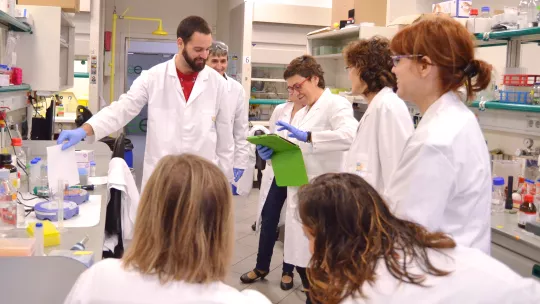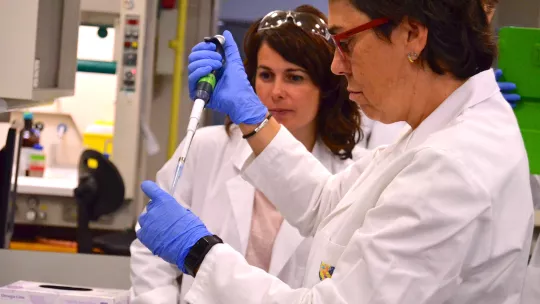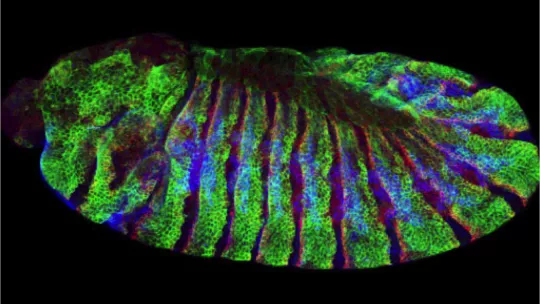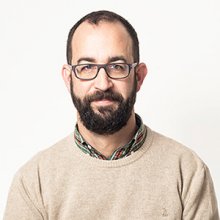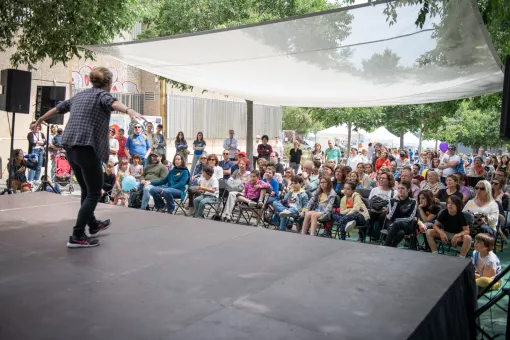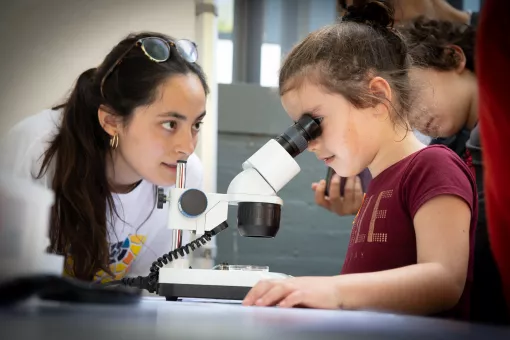Images
IRB Barcelona is to participate in the twelfth edition of the Catalunya La Pedrera Foundation's Teachers and Science Programme.
Teachers will work alongside the scientists to develop resources that can be taken back to the classroom.
On 17 and 18 March, fifteen secondary school teachers from around Catalonia will have the opportunity to learn about the fruit fly Drosophila melanogaster, an animal model used to study developmental processes. Organised in collaboration with the Catalunya La Pedrera Foundation's Teachers and Science Programme and the Barcelona Science Park, the one-and-a-half-day course “On the fly: A practical course for teachers on development in Drosophila melanogaster” will be given by researchers at IRB Barcelona.
This is the fourth edition of the Drosophila melanogaster course, part of the Teachers and Science Programme in which IRB Barcelona also offers the “Chemistry: the basic ingredient of biomedical research” and "Cancer, Metastasis and Personalized Medicine" courses. These activities aim to “transfer knowledge from research laboratories to teachers and schools, as a great way to train those who educate our children and society,” explains Marco Milán, leader of the Development and Growth Control Lab at IRB Barcelona and one of the scientists taking part in the “On the fly” course.
Based on biomedical research using the fly model Drosophila melanogaster, this course will address topics such as cell division, cell-fate determination, the regulation of tissue growth and how errors in these processes can lead to disease. Several topics in the curriculum of children over the age of 12 will be touched upon: mitosis, cell death, genetic diseases and the ethics of animal experimentation.
In the first part of the course, leading developmental biologists will present an overview of current knowledge about Drosophila and discuss why it is an important tool to help us learn about human health. The Friday session will include a welcome speech by IRB Barcelona’s director, Joan J. Guinovart, followed by presentations by the Cell and Developmental Biology Programme researchers Cayetano González, Jordi Casanova and Marco Milán.
Involving various other scientists from the institute, the workshops on Saturday will take a look at the specifics of fly genetics and embryonic development. They will also provide a hands-on look at the molecular biology techniques used by researchers to produce flies with specific characteristics, thus allowing teachers to put into practice what they have learned.
“The course aims to show the usefulness of a model organisms such as Drosophila in the field of biomedicine and the potential of Spain in Drosophila research. It also showcases the value of basic research and the generation of knowledge in biomedicine,” stresses Marco Milán.
Meet Our Scientist Marco Milán, expert on the use of Drosophila melanogaster:
Teachers and scientists working together
During the course, scientists and teachers will work together to develop resources that can then be taken back to the classroom, and once the course has finished teachers will be provided with educational material and online resources to be able to recreate the practical sessions under certain conditions. They will also be encouraged to establish channels of communication and networks, which will serve as a useful resource.
More information about the course
About IRB Barcelona
Created in 2005 by the Generalitat de Catalunya (Government of Catalonia) and University of Barcelona, IRB Barcelona is a Severo Ochoa Centre of Excellence, a seal that was awarded in 2011. The institute is devoted to conducting research of excellence in biomedicine and to transferring results to clinical practice, thus improving people’s quality of life, while simultaneously promoting the training of outstanding researchers, technology transfer, and public communication of science. Its 23 laboratories and seven core facilities address basic questions in biology and are orientated to diseases such as cancer, metastasis, Alzheimer’s, diabetes, and rare conditions. IRB Barcelona is an international centre that hosts more than 400 employees and 36 nationalities. It is located in the Barcelona Science Park. IRB Barcelona forms part of the Barcelona Institute of Science and Technology (BIST) and the “Xarxa de Centres de Recerca de Catalunya” (CERCA).
About IRB Barcelona
The Institute for Research in Biomedicine (IRB Barcelona) pursues a society free of disease. To this end, it conducts multidisciplinary research of excellence to cure cancer and other diseases linked to ageing. It establishes technology transfer agreements with the pharmaceutical industry and major hospitals to bring research results closer to society, and organises a range of science outreach activities to engage the public in an open dialogue. IRB Barcelona is an international centre that hosts 400 researchers and more than 30 nationalities. Recognised as a Severo Ochoa Centre of Excellence since 2011, IRB Barcelona is a CERCA centre and member of the Barcelona Institute of Science and Technology (BIST).

